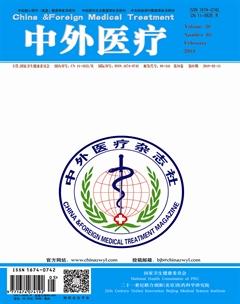延长重组人α—2b干扰素抗乙肝病毒治疗疗程的临床效果
李火炎
[摘要] 目的 分析研究延長重组人α-2b干扰素抗乙肝病毒治疗疗程的临床效果。 方法 采用单双号分组的方式将方便选取的2014年1月—2015年5月期间该院接收的乙肝病毒患者80例分为两组,分别为对照组(12个月治疗)和观察组(18个月治疗),所有患者均接受重组人α-2b干扰素治疗,对两组患者的肝功能复常情况、HBeAg转阴情况、HBeAg/HBeAb转换情况以及HBVDNA转阴情况进行比较。 结果 观察组患者治疗结束时肝功能复常占比(95.00%)明显较对照组(75.00%)高(χ2=6.27,P<0.05);于治疗结束时,观察组患者的HBeAg转阴占比、HBeAg/HBeAb转换占比比较,差异无统计学意义(P>0.05);观察组患者随访6个月、12个月、18个月的肝功能复常占比(95.00%、90.00%、87.50%)、HBVDNA转阴占比(87.50%、45.00%、45.00%)均明显较对照组高(P<0.05);观察组患者随访12个月及18个月的HBeAg转阴占比(57.50%、50.00%)、HBeAg/HBeAb转换占比(50.00%、62.50%)亦明显高于对照组(P<0.05)。 结论 延长重组人α-2b干扰素抗乙肝病毒治疗疗程可以将疾病复发率降低,且有利于提升患者的应答率,对病情进展有缓解作用,且有利于降低肝硬化及肝癌的发生率。
[关键词] 延长;重组人α-2b干扰素;乙肝病毒;疗程
[中图分类号] R711 [文献标识码] A [文章编号] 1674-0742(2019)02(b)-0007-03
Prolonging the Clinical Effect of Recombinant Human α-2b Interferon against Hepatitis B Virus Treatment
LI Huo-yan
Department of Infectious Diseases, Third Hospital of Xiamen, Xiamen, Fujian Province, 361100 China
[Abstract] Objective To analyze the clinical effect of prolonging the treatment of recombinant human α-2b interferon against hepatitis B virus. Methods 80 patients (hepatitis B from January 2014 to May 2015) received by the hospital were divided into two groups, the control group (12 months treatment) and the observation group (18 months treatment). All patients were treated with recombinant human α-2b interferon, and the liver function, HBeAg negative, HBeAg/HBeAb transition, and HBVDNA negative were compared between the two groups. Results In the observation group, the proportion of liver function recurrence (95.00%) was significantly higher than that of the control group (75.00%) (χ2=6.27, P<0.05). At the end of treatment, the HBeAg ratio, HBeAg/HBeAb conversion ratio of the observation group was not significantly different(P>0.05); patients in the observation group were followed up for 6 months, 12 months, 18 months, and the proportion of liver function recurrence (95.00%, 90.00%, 87.50%), HBVDNA proportion of negative conversion (87.50%, 45.00%, 45.00%) was significantly higher than that of the control group(P<0.05). The patients in the observation group were followed up for 12 months and 18 months for HBeAg transfer ratio of yin (57.50%, 50.00%) and HBeAg/HBeAb conversion (50.00%, 62.50%) was also significantly higher than that of the control group(P<0.05). Conclusion Prolonging the treatment of recombinant human α-2b interferon against hepatitis B virus can reduce the recurrence rate of the disease, and it is beneficial to improve the response rate of patients, and it can alleviate the progress of the disease, and it is beneficial to reduce the incidence of liver cirrhosis and liver cancer.

